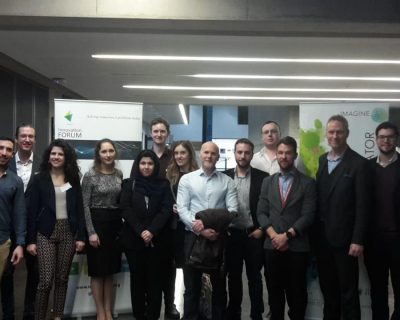Branch
Select your branch
Manchester Event: IoT and Healthcare, Energy and Life Sciences
To clarify, the “thing” is any data from a machine or technology. It

On 4th May, 2017, Innovation Forum (IF) Manchester organised an event to reveal what the connection between IoT and healthcare, energy and life sciences brings to society and why we should care about it?
Daniel Moreno, President of IF Manchester opened the evening by introducing IF to the public and discussing the vision and opportunities IF holds for collaborators.

According to Tacis Gavoyannis, Head of Smart Cities and IoT at ATKearney, the IoT opportunity is estimated to be$14.6 trillion by 2030 and will impact close to 6% of the global economy. “It is a huge potential for small and large organisations. Hybrids of new organisations using the larger ones, getting to scale and creating new jobs”. And this is not surprising as IoT will require and offer opportunities to engage with multiple capabilities. There are four main areas included: services (drone deliveries, energy usage), sensors (smart meters, wearables), infrastructure and platforms (data aggregation and storage) and applications (data analysis).
Although a lot of projects currently focus on innovation, much work still needs to be done. Compared to other cities, Manchester is a leader in combining and linking different sectors with each other: transport to energy, energy to health, and health to wearables.
Tacis believes that organisations like IF would be helpful for the IoT industry because “…a lot comes out from the Universities and small companies and also larger organisations, like ATKearney, which help SMEs with IP. So, we need to work more collaboratively than we have done in the last 20 years.” Indeed, collaboration is the key for innovation and this is the reason why IF builds bridges between academia, the private sector and policy makers.

Steve Gardner, CEO from Row Analytics Ltd specializes in informatics and has a strong track record of building world-class companies, teams and products mainly for the life science industry. Steve believes that currently, we have the largest amount of data we ever had, which spans from the full genetic profile of a patient to all prescription histories. However, the problem arises when a medical professional has to “translate” this data to a patient and make a meaningful conclusion in the context of an individual, rather than a specific disease. Thus, the future lies in improving developmental tools that can be used in and outside of clinical settings: to analyse this data which will eventually support users in staying well by improving their diet and lifestyle. Steve also supports the idea that IoT contributes to advanced data analytics, data collection and real-time data.

Nick Chrissos, Head of Innovation Tech for Cisco UK and the Project Director for CityVerve, highlighted the importance of IoT and Cisco involvement in the Manchester project. “Cisco is the industrial partner, the leading industrial partner. We are running it. We are the Tech Director for the project and the Cisco CREATE team is managing the project. With the leadership of Manchester City councils, but Cisco is in the middle of delivering it and we are very proud to be partners in this project”.

We asked Nick whether there is a point, at which making the city smarter is making people ignorant. According to the leader, smart cities are about improving lives of people: making these better and easier. Cisco has considered the possibility of citizens becoming spoilt without realizing, how to operate light switches or thermostats in non-smart homes. However, Nick believes that in reality, this technology will become more ubiquitous and its users will be more in tune with the future.


Manchester School of Architecture, discussed the variation in the current occupation density in the UK, how this affects the housing landscape and what influence IoT has on modern architecture.







